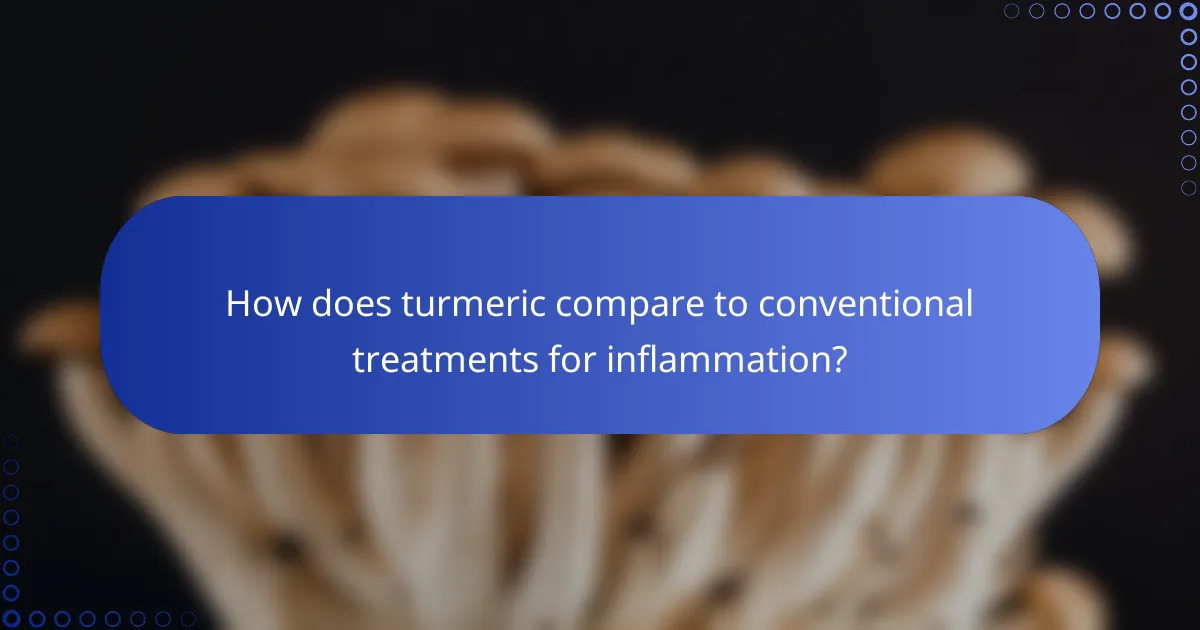Turmeric offers significant anti-inflammatory benefits that can aid in managing rare diseases characterized by chronic inflammation. Its active compound, curcumin, inhibits inflammatory pathways and reduces harmful markers. This article explores the integration of turmeric into daily diets, its effectiveness compared to conventional treatments, and best practices for maximizing its benefits in rare disease management. Additionally, we will discuss potential interactions with medications and the importance of consulting healthcare providers.

What are the key anti-inflammatory properties of turmeric?
Turmeric possesses key anti-inflammatory properties that can aid in rare disease management. Its active compound, curcumin, inhibits inflammatory pathways, reducing markers like cytokines and enzymes associated with inflammation. Additionally, turmeric’s antioxidant properties protect cells from oxidative stress, further supporting its anti-inflammatory effects. Research indicates that turmeric can enhance the efficacy of conventional treatments, making it a valuable adjunct in managing rare inflammatory diseases.
How does curcumin contribute to turmeric’s effectiveness?
Curcumin significantly enhances turmeric’s anti-inflammatory effects through its potent bioactive properties. It inhibits inflammatory pathways, reducing cytokine production and oxidative stress. This mechanism supports the management of rare diseases linked to chronic inflammation. Curcumin’s unique attribute is its ability to modulate multiple signaling pathways, making it a vital component of turmeric’s overall efficacy.
Which compounds in turmeric enhance its healing properties?
Curcumin is the primary compound in turmeric that enhances its healing properties, particularly its anti-inflammatory benefits. Other beneficial compounds include turmerone and demethoxycurcumin, which contribute to turmeric’s overall therapeutic effects. These compounds work synergistically to reduce inflammation and support rare disease management. Curcumin, for example, has been shown to inhibit inflammatory pathways, making it effective in various health conditions.

How can turmeric be integrated into daily diets for health benefits?
Turmeric can be integrated into daily diets through various methods to harness its anti-inflammatory benefits. Incorporating turmeric into smoothies, soups, or teas enhances meals while providing health advantages.
1. Add turmeric to smoothies for a nutrient boost.
2. Use turmeric in soups for added flavor and health benefits.
3. Brew turmeric tea for a soothing drink.
4. Sprinkle turmeric on roasted vegetables for a healthy side dish.
5. Mix turmeric into salad dressings for an extra kick.
Regular consumption may help manage inflammation associated with rare diseases.
What are the most effective forms of turmeric intake?
Turmeric is most effectively taken in forms such as capsules, powders, and teas. Capsules offer concentrated doses, while powders can be added to foods or drinks. Teas provide a soothing method for intake. Each form enhances the bioavailability of curcumin, the active compound known for its anti-inflammatory benefits.
How does dosage impact turmeric’s anti-inflammatory effects?
Dosage significantly impacts turmeric’s anti-inflammatory effects. Higher doses of turmeric, particularly its active compound curcumin, enhance its ability to reduce inflammation in rare disease management. Studies indicate that doses ranging from 500 mg to 2,000 mg daily optimize these benefits. Individual responses may vary, making personalized dosing essential for maximum efficacy.

Which rare diseases may benefit from turmeric’s anti-inflammatory properties?
Turmeric’s anti-inflammatory properties may benefit several rare diseases, including Crohn’s disease, cystic fibrosis, and sarcoidosis. These conditions often involve chronic inflammation, which turmeric can help mitigate. Research indicates that curcumin, the active compound in turmeric, reduces inflammatory markers and may improve symptoms. In cystic fibrosis, for example, turmeric may enhance lung function by decreasing airway inflammation. Additionally, its antioxidant properties can support overall health in patients with these rare diseases.
What specific conditions have shown positive responses to turmeric supplementation?
Turmeric supplementation shows positive responses in conditions like arthritis, inflammatory bowel disease, and metabolic syndrome. Research indicates that curcumin, the active compound in turmeric, helps reduce inflammation and improve symptoms in these diseases. For example, a study demonstrated significant improvement in joint pain and function among arthritis patients using curcumin supplements. Additionally, turmeric’s antioxidant properties may aid in managing symptoms of inflammatory bowel disease by reducing gut inflammation. Overall, turmeric can be a beneficial adjunct in the management of these rare diseases.

How does turmeric compare to conventional treatments for inflammation?
Turmeric offers a natural alternative to conventional treatments for inflammation, showing comparable effectiveness. Studies indicate that curcumin, the active compound in turmeric, reduces inflammatory markers similarly to non-steroidal anti-inflammatory drugs (NSAIDs).
Turmeric’s anti-inflammatory benefits are attributed to its unique attribute, curcumin, which inhibits inflammatory pathways. In contrast, conventional treatments may carry side effects such as gastrointestinal issues and long-term dependency risks.
A comparative analysis reveals that turmeric can be a safer adjunct therapy, particularly for individuals managing rare diseases where conventional treatments may not be effective or suitable.
| Treatment Type | Efficacy | Side Effects | Duration of Action | Forms of Intake |
|————————-|———————|———————————-|——————-|——————-|
| Turmeric | Comparable | Minimal, generally safe | Varies | Powder, capsules |
| NSAIDs | High | Gastrointestinal issues, ulcers | Short-term | Tablets, liquids |
What advantages does turmeric offer over pharmaceutical options?
Turmeric offers several advantages over pharmaceutical options for managing inflammation related to rare diseases. Its natural anti-inflammatory compounds, particularly curcumin, provide effective relief without the side effects often associated with medications.
Turmeric has been shown to modulate inflammatory pathways, potentially reducing the need for steroids or NSAIDs. Additionally, it supports overall health by enhancing antioxidant levels and promoting better digestion. Unlike many pharmaceuticals, turmeric is generally well-tolerated, making it a safer long-term option for individuals with chronic conditions.
Research indicates that turmeric can improve quality of life and reduce inflammation markers in patients with autoimmune disorders. This holistic approach can complement traditional treatments, offering a multi-faceted strategy for rare disease management.
Are there any limitations to using turmeric for inflammation management?
Turmeric has some limitations for inflammation management. Its effectiveness can vary based on dosage, form of intake, and individual health conditions. High doses may cause gastrointestinal issues, and absorption can be low without black pepper or fat. Additionally, turmeric may interact with certain medications, limiting its use for some individuals.

What are the potential interactions between turmeric and other medications?
Turmeric may interact with several medications, affecting their efficacy or safety. It can enhance the effects of anticoagulants, increasing bleeding risk. Additionally, turmeric may reduce the effectiveness of certain chemotherapy drugs by altering their metabolism. Patients should consult healthcare providers before combining turmeric with any medication.
Which medications should be approached with caution when using turmeric?
Turmeric should be approached with caution when using blood thinners, diabetes medications, and antacids. These medications may interact with turmeric’s properties, potentially altering their effectiveness or increasing side effects. For instance, turmeric can enhance the effects of anticoagulants, leading to an increased risk of bleeding. Additionally, it may affect blood sugar levels, necessitating careful monitoring for those on diabetes medications. Always consult a healthcare professional before combining turmeric with these medications.
How can patients ensure safe turmeric use alongside prescribed treatments?
Patients can ensure safe turmeric use alongside prescribed treatments by consulting healthcare providers before starting turmeric. Monitoring for interactions is essential, as turmeric may affect blood clotting and certain medications. Maintaining appropriate dosages is crucial to avoid adverse effects. Regular communication with healthcare professionals helps manage any potential complications effectively.

What best practices should be followed when using turmeric for health?
To maximize turmeric’s anti-inflammatory benefits for rare disease management, follow these best practices. Use high-quality turmeric supplements or fresh turmeric root for optimal potency. Incorporate black pepper to enhance curcumin absorption. Aim for a daily intake of 500 to 2000 mg of curcumin, depending on individual health needs. Consult with a healthcare provider for personalized dosage and to avoid interactions with medications.
What are common mistakes to avoid when incorporating turmeric into wellness routines?
Avoiding common mistakes when incorporating turmeric into wellness routines is essential for maximizing its anti-inflammatory benefits. Key errors include neglecting proper dosage, overlooking potential interactions with medications, and failing to combine turmeric with black pepper for enhanced absorption. Additionally, consuming low-quality turmeric supplements can diminish effectiveness. Lastly, not allowing time for turmeric’s benefits to manifest may lead to premature conclusions about its efficacy.
How can individuals maximize the benefits of turmeric in their diet?
To maximize the benefits of turmeric in their diet, individuals should incorporate it regularly in various forms. Consuming turmeric with black pepper enhances curcumin absorption, crucial for its anti-inflammatory effects.
1. Add turmeric to smoothies for a nutritious boost.
2. Use it in cooking, especially in curries and soups.
3. Prepare turmeric tea by steeping it in hot water.
4. Consider turmeric supplements for concentrated doses.
5. Pair it with healthy fats like coconut oil for better absorption.
These strategies can help individuals effectively utilize turmeric’s anti-inflammatory properties for managing rare diseases.